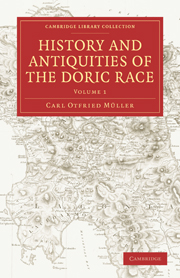Book contents
- Frontmatter
- THE TRANSLATORS' PREFACE
- Contents
- INTRODUCTION
- BOOK I HISTORY OF THE DORIC RACE, FROM THE EARLIEST TIMES TO THE END OF THE PELOPONNESIAN WAR
- BOOK II RELIGION AND MYTHOLOGY OF THE DORIANS
- APPENDIX
- APPENDIX I
- APPENDIX II
- APPENDIX III
- APPENDIX IV
- APPENDIX V
- ADDITIONS AND CORRECTIONS
- Plate section
APPENDIX V
Published online by Cambridge University Press: 05 August 2011
- Frontmatter
- THE TRANSLATORS' PREFACE
- Contents
- INTRODUCTION
- BOOK I HISTORY OF THE DORIC RACE, FROM THE EARLIEST TIMES TO THE END OF THE PELOPONNESIAN WAR
- BOOK II RELIGION AND MYTHOLOGY OF THE DORIANS
- APPENDIX
- APPENDIX I
- APPENDIX II
- APPENDIX III
- APPENDIX IV
- APPENDIX V
- ADDITIONS AND CORRECTIONS
- Plate section
Summary
Of the ancient writers on the Mythology of Hercules.
1. It would without doubt increase our knowledge both of the Epic Poetry and Mythology of the Greeks, if these two branches of learning were placed in a nearer relation to each other, by combining researches into the contents of the Epic Poems with a systematic investigation of the various characters assumed by the mythological traditions at different periods. The following brief remarks must be considered as merely intended to awaken the industry of those who are better fitted than myself to undertake such a task, and perhaps to give some small assistance towards the discovery of a method, which may afford greater certainty to mythological inquiries, and extend the range of literary discussions.
2. Plutarch had composed a work Περὶ ʿΗραϰλέους which he himself quotes in Vit. Thes. 28. Fragm. p. 353. What authorities he esteemed the most worthy of credit may be gathered from the following passage, “Of the ancient au- “thors who were skilled in tradition, neither Homer, He- “siod, Archilochus, Peisander, Stesichorus, Alcman, or “Pindar ever had any idea of an Egyptian or Phœnician “Hercules: all recognize one Hercules only, viz. the Bœ- “otian and Argive.” Here we should remark, in the first place, that Peisander, agreeably to his great antiquity, is placed between Archilochus and Stesichorus, and Panyasis omitted as an author of too late a date.
- Type
- Chapter
- Information
- History and Antiquities of the Doric Race , pp. 523 - 544Publisher: Cambridge University PressPrint publication year: 2010First published in: 1830



